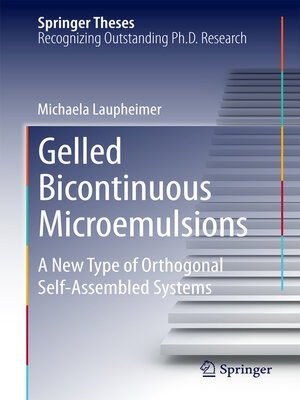Gelled Bicontinuous Microemulsions
ebook ∣ A New Type of Orthogonal Self-Assembled Systems · Springer Theses
By Michaela Laupheimer

Sign up to save your library
With an OverDrive account, you can save your favorite libraries for at-a-glance information about availability. Find out more about OverDrive accounts.
Find this title in Libby, the library reading app by OverDrive.



Search for a digital library with this title
Title found at these libraries:
| Library Name | Distance |
|---|---|
| Loading... |
Microemulsions and gels are well-known systems, which play a major role in colloidal and interfacial science. In contrast, the concept of gel microemulsions is still quite new. Gelled microemulsions are highly promising for microemulsion applications in which low viscosity is undesirable, such as administering a drug-delivering microemulsion to a certain area of the skin. It is essential to understand the properties of and structures formed in a system combining microemulsion components and a gelator. This PhD thesis by Michaela Laupheimer provides an in-depth discussion of the phase behavior and sol-gel transition of a microemulsion gelled by a low molecular weight gelator as well as the rheological behavior of a gelled bicontinuous microemulsion. Moreover, the microstructure of the gelled bicontinuous system is fully clarified using techniques like self-diffusion NMR and small angle neutron scattering (SANS). By comparing gelled bicontinuous microemulsions with corresponding non-gelled microemulsions and binary gels, it is demonstrated that bicontinuous microemulsion domains coexist with a gelator network and that the coexisting structures possess no fundamental mutual influence. Hence, gelled bicontinuous microemulsions have been identified as a new type of orthogonal self-assembled system.







